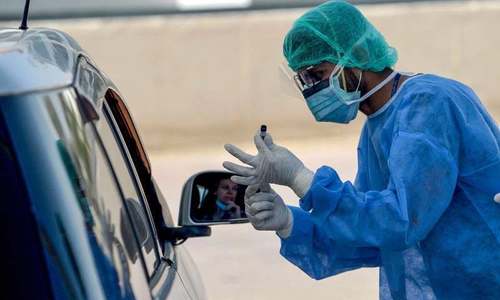PESHAWAR: The health department has begun the random testing of the vulnerable population across Khyber Pakhtunkhwa for novel coronavirus in an effort to increase the number of tests and know about the prevalence of the infection.
Officials told Dawn that health workers were randomly collecting swabs from people working in markets, shopping malls, hotels and tourist places for free Covid-19 testing.
They said samples had so far been collected from 8,340 people.
The officials said 375 samples had turned out to be positive and 4,226 negative for coronavirus, while the test results of 3,203 were awaited.
According to them, the province has around 6,000 testing capacity daily at the 16 Covid-19 labs, including 11 in public sector and five in private sector, but was struggling to scale up testing and ascertain the number of patients in the province.
Officials said they were carrying out around 2,000 tests daily on average contrary to the WHO’s guidelines of 5,000 tests per day.
They said the health workers were finding it hard to collect higher number of testing samples due to fewer cases.
Officials say initiative meant to increase tests, learn about virus incidence
“We’re tracing contacts of the confirmed Covid-19 patients but as the number of the positive cases has declined, we can only trace their contacts,” an official told Dawn.
He said both Covid-19 cases and hospitalisation had declined in the province by 100 per cent during the last two weeks.
The official said currently, only 28 coronavirus patients were admitted to hospitals with only eight of them being on ventilators.
“There is a drastic decline in the positivity of Covid-19 swabs, which is between three and five per cent in Khyber Pakhtunkhwa. This trend is recorded throughout the country. There is an overall decline in coronavirus incidence but there is no scientific evidence to suggest that infection is going away,” he said.
Other officials said they had also established sentinel sites throughout the province, where the people with severe acute respiratory infection and influenzas like illnesses were being tested for Covid-19 compulsorily.
They said those facilities had so far tested 5,918 people and 131 of them were diagnosed with the virus. The process is under way, they said.
Meanwhile, Khyber Pakhtunkhwa has been recording less than 100 Covid-19 cases daily for the last two weeks showing that the virus incidence is on the decline, said experts.
They, however, said they couldn’t say anything about it with certainty.
The experts said they were holding a training workshop for the pathologists working in Covid-19 labs in the province.
According to them, the workshop to be held at the Khyber Medical University Peshawar where the representatives of the WHO and National Institute of Health as well the faculty members of the KMU will hold discussion regarding the quality control and assurance of tests.
KMU Vice-Chancellor Prof Ziaul Haq told Dawn that the university had arranged a training programme for staff members of all labs in to assess their performance and discuss the issues they faced.
He said the experts were also carrying out inspections of the Covid-19 periodically to assess their work and ensure a quality assurance and quality control, he said.
“It is a good sign that positivity is doing down but still we should strictly adhere to safety precautions,” he said.
Prof Ziaul Haq said the KMU was also in the process of sending about 350 positive samples to China to see if the virus had become less infective.
“The outcome of the study being conducted in collaboration with Quaid-i-Azam University Islamabad in China will be shared with the government. It will be interesting study that will show the infectivity level of the virus,” he said.
Published in Dawn, August 23rd, 2020















































